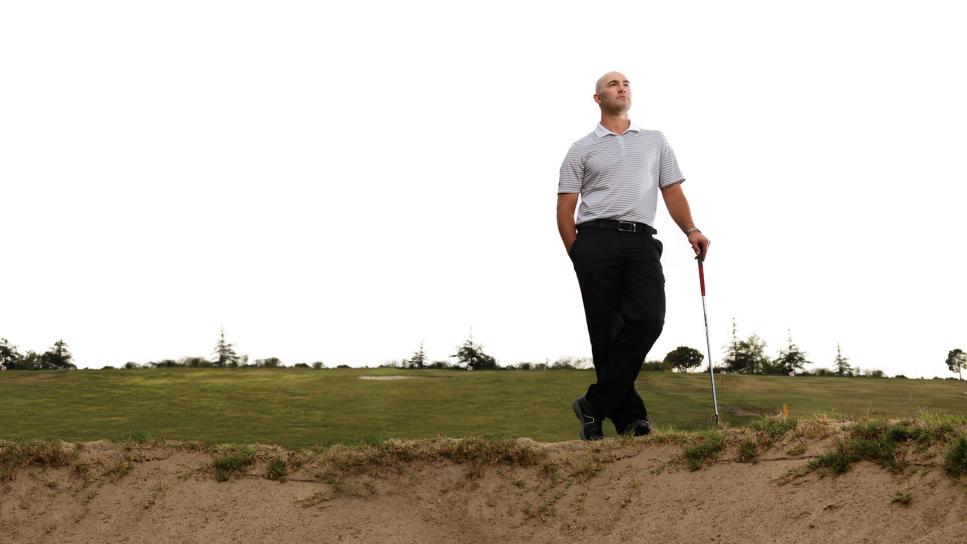Golfers We Like: The Wounded Warrior Turned Pro

Photo by J.D. Cuban
On a searing day in late September 2009, in a dusty village in southwest Afghanistan, insurgents and coalition forces locked in ferocious battle.
A Taliban fighter in a fortified mud hut aimed his Dragunov sniper rifle at a U.S. Marine Raider whose infuriatingly accurate machine gun had just eliminated a cadre of resupply men on mopeds. The sniper loaded a bullet the size of a big man's middle finger. He squeezed the trigger. The projectile zipped through the concussed, smoky air at Sgt. Aaron Silton.
A shell propelled by a Dragunov travels at about 2,700 feet per second, about 10 times as fast as a golf ball hit with a driver by an elite player. Not that Silton thought in golf terms. Not then. He'd been a soccer, hockey and lacrosse player for the Westford (Mass.) High School Grey Ghosts. He and his buddies swatted range balls at the Kimball Farm Driving Range from time to time, but that was about it for Silton and golf.
The bullet reached its target—Silton's head—and he fell hard into a thorny tree. His comrades yanked hard on his left arm to get him out, maybe a little too hard. It got worse. At the hospital in Kandahar, Silton suffered a massive stroke to the left side of his brain, and the right side of his body went numb.
There were multiple surgeries, implanting titanium wire and a plate into his face and repairing his left shoulder, which alone took five operations. He couldn't talk, and movement in both sides of his body was severely limited. Aaron's post-traumatic stress disorder, says his sister, Rachel, was "more than moderate." He hated crowds. In a restaurant, he had to sit with his back to the wall. He had nightmares about bleeding into the orange Afghanistan sand. "I was just an angry person," Silton says. "And very handicapped. I couldn't button my shirt. What most of us take for granted ..."
Late 2010, after a move to San Diego, and thanks to a gift of clubs from the Wounded Warrior Project, the frustrated man took up the most frustrating game. He'd sweat through therapy from 7 to noon, then report to Marine Memorial, the Camp Pendleton golf course. He liked being outdoors, but that was the only thing he liked about it.
"I thought, They can't be serious. This game sucks. Why would anyone play it? I couldn't get the ball in the air. I couldn't hit an 8-iron 100 yards. I was just awful."
But they keep score in golf, and Silton, a man who identifies missions and then achieves them, decided he would at least try to get better. He shot 135, then 120, then 100. He got new clubs, custom-fit this time. His scores kept falling. "I thought, Huh, there is something to this sport. It got the left side and the right side of my body working together."
More than that, golf replaced Silton's hopeless obsession with going back to Afghanistan to get revenge on the Taliban fighter who shot him. With time, and help from U.S. Special Operations Command and the Yellow Ribbon Foundation, Silton eased back into civilian life. Then he became a golf pro.
At his 2014 graduation from the Golf Academy of America, he introduced himself to the commencement speaker, Susan Roll, co-owner of Carlsbad Golf Center, a range and learning center. She had tears in her eyes when she heard his story, then she hired him as an assistant pro. Today he fixes and fits clubs, but mostly he teaches, including group lessons for eight to 10 juniors.
"My goal is making sure everyone enjoys it and realizes the fun of this game," Silton says. "I'm not trying to make PGA pros, not at all. And for the kids who don't want to be there, who get mad or think golf is awful, I say, 'I was in Afghanistan, and it was 135 degrees, and I was shot in the face, and I was fighting for my life. So why don't you rethink this?' And you can see a change in them, and they say, 'You're right, this is not that serious.' "
Les Duer is the golf-shop facility manager. "I'm retired United States Marine Corps as well," he says, "and I was a little leery of his kinda rough look [shaved head] and his little speech impediment. Sometimes he kinda yells at 'em, or at least talks loudly. But those kids love him. Parents, too. They come into the shop to thank me for Aaron. In my 12 years here, I've never had that before."

.jpg)